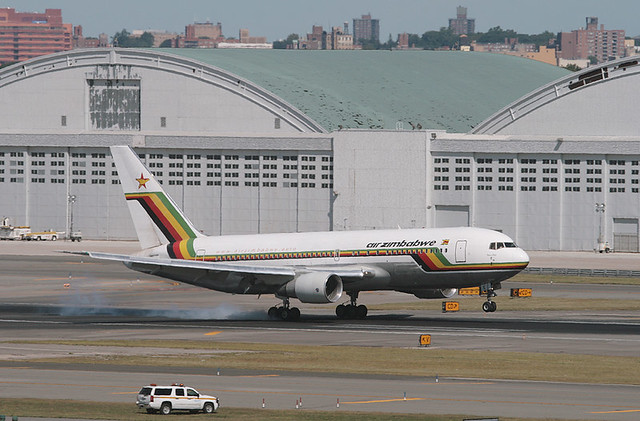 In what is fast becoming a bad trait associated with Air Zimbabwe (UM), the carrier on Monday, flew an empty (i.e no pax) Boeing 767 aircraft from Johannesburg to Harare on its inaugural flight, as the carrier struggles to resume regional operations.
In what is fast becoming a bad trait associated with Air Zimbabwe (UM), the carrier on Monday, flew an empty (i.e no pax) Boeing 767 aircraft from Johannesburg to Harare on its inaugural flight, as the carrier struggles to resume regional operations.
Zimbabwean paper, The Daily News reported that Air Zimbabwe ferried just five passengers to Johannesburg with the corresponding return flight operating empty:
"The airline cruised the Johannesburg-Harare route with nine flight crew aboard including two pilots only identified as Captain Jonasi and Murombedzi, the first flight officer, an engineer and six air hostesses.
The insiders said the embarrassing incident was a result of poor marketing by the troubled airline which on Monday resumed regional flights having suspended them in January after creditors threatened to seize the carrier’s aircraft over crippling debts."
 |
| An Air Zimbabwe 767 at JFK (ATI) |
In May, the carrier's previous attempt at restarting services resulted in a similar negative response with just 3 passengers being ferried between Harare and Bulawayo. Prior to that, in 2005, an Air Zimbabwe 767 flew 6,000 km (3,728 miles) from Dubai with a solitary passenger aboard.
The paper attributes the poor passenger uptake to poor marketing, though in all likelihood, people have simply grown tired of Air Zimbabwe's reputation for shoddy service and last minute cancellations.
Whilst there is much wrangling in the Zimbabwean government over Air Zimbabwe's future apropos the settling of its debts, no thought has been given as to how the airline will sustain itself if and when its bills are paid off.
With other more reliable options available between Harare and Johannesburg (and other routes for that matter), passengers and their wallets will have a strong say in who gets voted off the proverbial island, hence Air Zimbabwe will indeed have to cling
for dear life to the heavily skewed policies of the Zimbabwean
government that strongly favour it in its domestic market, as that will
most likely be its only source of income in the long run.
